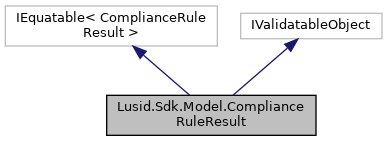ComplianceRuleResult
More...
|
| string | RuleId [get, set] |
| | The unique identifierof a compliance rule More...
|
| |
| string | RuleName [get, set] |
| | The User-given name of the rule More...
|
| |
| string | RuleDescription [get, set] |
| | The User-given description of the rule More...
|
| |
| ResourceId | Portfolio [get, set] |
| | Gets or Sets Portfolio More...
|
| |
| bool | Passed [get, set] |
| | The result of an individual compliance run, true if passed More...
|
| |
| decimal | ResultValue [get, set] |
| | The calculation result that was used to confirm a pass/fail More...
|
| |
| string | RuleInformationMatch [get, set] |
| | The value matched by the rule More...
|
| |
| string | RuleInformationKey [get, set] |
| | The property key matched by the rule More...
|
| |
| decimal | RuleLowerLimit [get, set] |
| | The lower limit of the rule More...
|
| |
| decimal | RuleUpperLimit [get, set] |
| | The upper limit of the rule More...
|
| |
◆ ComplianceRuleResult() [1/2]
| Lusid.Sdk.Model.ComplianceRuleResult.ComplianceRuleResult |
( |
| ) |
|
|
inlineprotected |
◆ ComplianceRuleResult() [2/2]
| Lusid.Sdk.Model.ComplianceRuleResult.ComplianceRuleResult |
( |
string |
ruleId = default(string), |
|
|
string |
ruleName = default(string), |
|
|
string |
ruleDescription = default(string), |
|
|
ResourceId |
portfolio = default(ResourceId), |
|
|
bool |
passed = default(bool), |
|
|
decimal |
resultValue = default(decimal), |
|
|
string |
ruleInformationMatch = default(string), |
|
|
string |
ruleInformationKey = default(string), |
|
|
decimal |
ruleLowerLimit = default(decimal), |
|
|
decimal |
ruleUpperLimit = default(decimal) |
|
) |
| |
|
inline |
Initializes a new instance of the ComplianceRuleResult class.
- Parameters
-
| ruleId | The unique identifierof a compliance rule (required). |
| ruleName | The User-given name of the rule (required). |
| ruleDescription | The User-given description of the rule (required). |
| portfolio | portfolio (required). |
| passed | The result of an individual compliance run, true if passed (required). |
| resultValue | The calculation result that was used to confirm a pass/fail (required). |
| ruleInformationMatch | The value matched by the rule (required). |
| ruleInformationKey | The property key matched by the rule (required). |
| ruleLowerLimit | The lower limit of the rule (required). |
| ruleUpperLimit | The upper limit of the rule (required). |
◆ Equals() [1/2]
◆ Equals() [2/2]
| override bool Lusid.Sdk.Model.ComplianceRuleResult.Equals |
( |
object |
input | ) |
|
|
inline |
Returns true if objects are equal
- Parameters
-
| input | Object to be compared |
- Returns
- Boolean
◆ GetHashCode()
| override int Lusid.Sdk.Model.ComplianceRuleResult.GetHashCode |
( |
| ) |
|
|
inline |
Gets the hash code
- Returns
- Hash code
◆ ToJson()
| virtual string Lusid.Sdk.Model.ComplianceRuleResult.ToJson |
( |
| ) |
|
|
inlinevirtual |
Returns the JSON string presentation of the object
- Returns
- JSON string presentation of the object
◆ ToString()
| override string Lusid.Sdk.Model.ComplianceRuleResult.ToString |
( |
| ) |
|
|
inline |
Returns the string presentation of the object
- Returns
- String presentation of the object
◆ Passed
| bool Lusid.Sdk.Model.ComplianceRuleResult.Passed |
|
getset |
The result of an individual compliance run, true if passed
The result of an individual compliance run, true if passed
◆ Portfolio
| ResourceId Lusid.Sdk.Model.ComplianceRuleResult.Portfolio |
|
getset |
◆ ResultValue
| decimal Lusid.Sdk.Model.ComplianceRuleResult.ResultValue |
|
getset |
The calculation result that was used to confirm a pass/fail
The calculation result that was used to confirm a pass/fail
◆ RuleDescription
| string Lusid.Sdk.Model.ComplianceRuleResult.RuleDescription |
|
getset |
The User-given description of the rule
The User-given description of the rule
◆ RuleId
| string Lusid.Sdk.Model.ComplianceRuleResult.RuleId |
|
getset |
The unique identifierof a compliance rule
The unique identifierof a compliance rule
◆ RuleInformationKey
| string Lusid.Sdk.Model.ComplianceRuleResult.RuleInformationKey |
|
getset |
The property key matched by the rule
The property key matched by the rule
◆ RuleInformationMatch
| string Lusid.Sdk.Model.ComplianceRuleResult.RuleInformationMatch |
|
getset |
The value matched by the rule
The value matched by the rule
◆ RuleLowerLimit
| decimal Lusid.Sdk.Model.ComplianceRuleResult.RuleLowerLimit |
|
getset |
The lower limit of the rule
The lower limit of the rule
◆ RuleName
| string Lusid.Sdk.Model.ComplianceRuleResult.RuleName |
|
getset |
The User-given name of the rule
The User-given name of the rule
◆ RuleUpperLimit
| decimal Lusid.Sdk.Model.ComplianceRuleResult.RuleUpperLimit |
|
getset |
The upper limit of the rule
The upper limit of the rule
The documentation for this class was generated from the following file:
- /home/docs/checkouts/readthedocs.org/user_builds/lusid-sdk-csharp/checkouts/latest/sdk/Lusid.Sdk/Model/ComplianceRuleResult.cs
